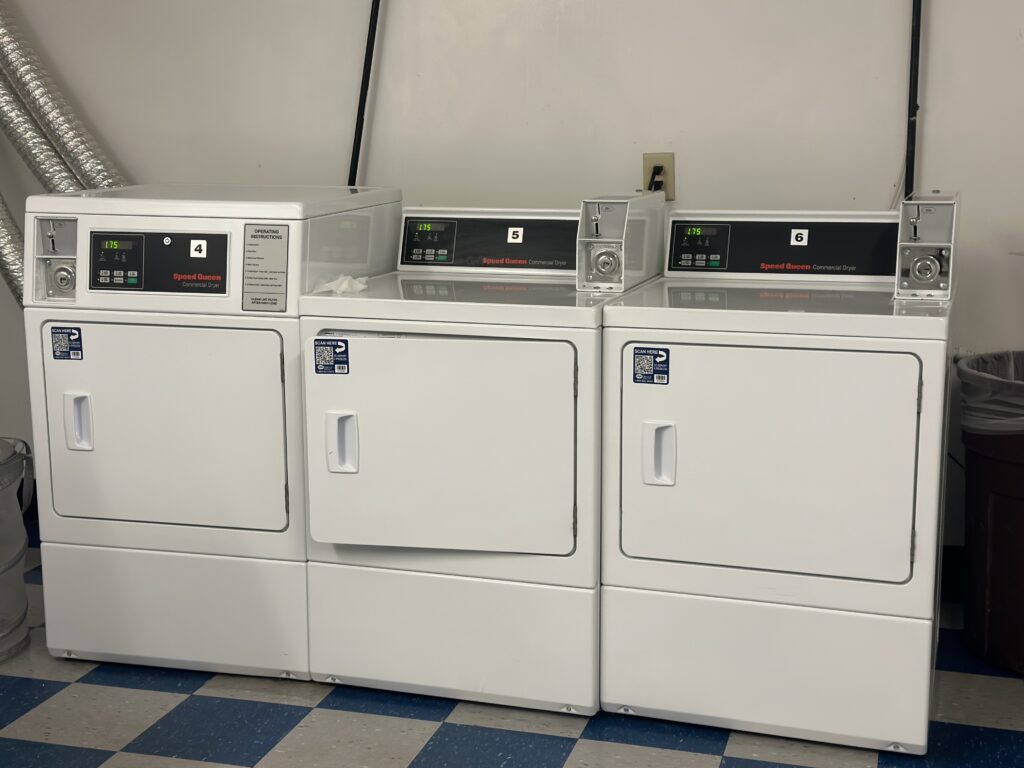Dryer incident in UMW Apartments elicits student frustrations, opinions about free laundry on campus
4 min read
Claire Watkins
Staff Writer
On Jan. 22, two fire trucks rushed into a parking lot at the UMW Apartments to address a dryer in Building 2 that had smoke coming from its lint trap.
That evening, Devin Schwers, a senior political science major, went to take his clothes out of a dryer when he noticed another dryer was billowing smoke. He contacted his RA about the incident, who instructed him to contact campus police.
Responders unplugged all three dryers in the building, which forced residents to use the laundry facilities in the building next door. As of Jan. 31, the dryers have not yet been fixed.
For Schwers, the smoking dryer compounded frustrations he and others have about the cost of laundry on campus.
“I think it’s a little ironic that we have to pay $1.75 for wash and then another $1.75 for drying, especially if our dryers are going to be shut down,” said Schwers. “I think it’s a little ridiculous, especially if these aren’t going to be well kept, and this is an issue.”
What surprised me about the incident wasn’t that a washer or dryer might break down; it was that students pay $1.75 for each cycle in the washer and the dryer.
This is my first semester at the University of Mary Washington, and as a commuter student, I do not have to pay for campus laundry services. However, at my previous college—Hollins University in Roanoke, Va.—I never had to scrounge for quarters or otherwise pay out-of-pocket to wash my clothes because they did not charge to use the laundry facilities.
According to the University of Mary Washington’s website, there are 116 washers and 118 dryers on campus. The machines accept quarters as payment, and students can also use the Speed Queen App.
But another issue arises with the Speed Queen App, as students have to deposit a minimum of $10 every time they want to add more funds to their accounts. Additionally, the website notes that “funds added to the Speed Queen App are not refundable.” As a result, if a student overestimates how much they may spend on laundry, they may lose money that sits in the app after they graduate or move off campus.
The alternative to the app is using quarters for the machines, but this is especially inconvenient since our society is turning more and more towards going cashless, which means students may not always have quarters to use for laundry.
If a student only does one load of laundry per week during the 16-week semester, it averages to $56 per semester. While that may not seem like a lot, this cost does not factor in detergent, dryer sheets or laundry baskets.
Besides, students are likely to do more laundry than that. For example, students need to wash their bedding and towels, and some people separate laundry loads into lights and darks. Student-athletes may also need to wash sports uniforms and merchandise more frequently.
It is unfair to charge students who are paying for room, board and tuition to also pay for laundry. In addition to these costs, the estimated cost of attendance for an on-campus student at UMW factors in over $5,000 of auxiliary fees per school year. According to UMW’s website regarding undergraduate tuition and fees, these auxiliary costs provide “funding for student services and activities.”
Besides Hollins, which is a private school, some public universities in Virginia, such as Radford and George Mason, offer free laundry for on-campus students. Similarly, Old Dominion University residents may use their ID cards for 30 free loads of laundry per semester and add funds through their student accounts as needed.
This is what students like Schwers think should happen at UMW.
For Sydney Bronski, a junior biology major, doing laundry at her family’s home is more convenient than using the university’s facilities.
“Luckily I live very close and I’m usually going home to pick up food or a book or something I had shipped there like once a week anyways. So, I just put all my laundry in a bag and take it there and wash it and bring it back,” she said.
Although Bronski goes home to do laundry, she shared her opinion about the cost of the machines on campus.
“I definitely think laundry should be free, especially with people going into debt being in college,” she said. “Just being able to do laundry without having to pay would be nice.”
In 2023, the Young Democratic Socialists of America’s chapter at UMW began a campaign against a tuition increase. As part of said campaign, they are looking at potential areas where the university could cut costs, as well as where to reallocate funds. The campaign is ongoing.
Donald Glander, a sophomore history and sociology double major who is also the current acting chair for UMW’s YDSA, spoke about the campaign.
“We will not accept a tuition increase nor cutting of other necessary programs; we believe the school should be able to take some of the funds from somewhere like the salaries of higher-level administrators,” he said. “We have yet to sit down and do the math, but as one part of the campaign, we plan to look at the school’s budget and give suggestions where they could reallocate funds when we submit our demands to the administration.”
In March 2023, the YDSA chapter at Brown/RISD was successful in its campaign for free laundry for on-campus students. According to the chapter’s Instagram post, over 1,000 students petitioned and emailed Brown’s administration until free laundry was implemented.
In addition to the hundreds of dollars students spend on required books every semester, the added out-of-pocket charge for laundry is an unwelcome reminder of how expensive higher education is. Therefore, UMW should ditch the app and the quarters and provide free laundry to their students.










